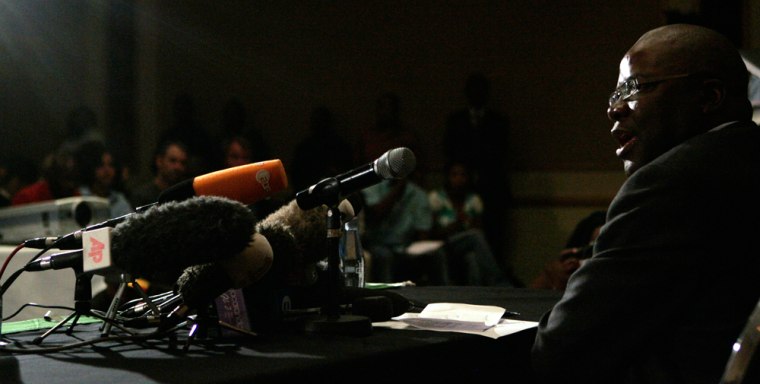The opposition party said Thursday it will not participate in a presidential runoff, while spokesmen for President Robert Mugabe and his chief rival said both will attend an emergency summit of southern African leaders this weekend.
The Movement for Democratic Change says its candidate, Morgan Tsvangirai, won the March 29 vote outright, and has accused Mugabe of delaying the results to give ruling party militants time to intimidate voters and ensure he wins a second round.
On Thursday, the opposition leadership met and resolved not to participate in any runoff presidential vote.
"We won the presidential election hands down, without the need for a runoff," MDC Secretary-General Tendai Biti told reporters at a news conference in neighboring South Africa. Party leaders had previously said they would not accept a second round, but the party had not taken a formal stance.
Deputy Information Minister Bright Matonga told CNN he believed opposition politicians would be "cowards" if they did not contest a runoff.
"They should come, they should face the music," he said.
Election results not released
Twelve days after the vote, the results from the presidential race have not been released. The High Court will decide Monday whether to grant an opposition request for release of the election results.
Zambian President Levy Mwanawasa has called an emergency summit of the Southern African Development Community for Saturday to discuss the crisis.
"Such meetings are usually very healthy so heads of state can brief each other, not only us in Zimbabwe," Zimbabwean Information Minister Sikhanyiso Ndlovu told The Associated Press.
But he insisted the meeting wasn't necessary. "There is no crisis in Zimbabwe that warrants a special meeting on Zimbabwe," he said.
Mwanawasa originally planned to send a delegation of former heads of state to Zimbabwe but decided to hold an urgent summit instead, Zambian state radio reported.
Matonga confirmed that Mugabe would attend. "If there is a SADC meeting of heads of state, then obviously he will attend," he told the AP.
Tsvangirai also will attend the summit, MDC spokesman Nqobizitha Mlilo said, calling him a "head of state." Biti said the party would press SADC to urge Mugabe to step down.
Tsvangirai, who was traveling throughout the region to ask Mugabe's peers to push him to end the standoff, was headed Thursday to South Africa to meet with President Thabo Mbeki, Mlilo said.
"If Mr. Tsvangirai is in town and before the president leaves for the next meeting and his program allows it, it is important to hear what Mr. Tsvangirai has to say," said Aziz Pahad, South Africa's deputy foreign affairs minister.
African leaders previously deferred to Mbeki and his strategy of "quiet diplomacy" on dealing with Zimbabwe. Mwanawasa has stood out as the only southern African leader to publicly criticize Mugabe's policies, last year likening the country's economy to "a sinking Titanic."
Mugabe tacitly acknowledges runoff
Mugabe has virtually conceded he did not win the election and appears to be campaigning for a runoff by intimidating his foes and fanning racial tensions.
Desmond Mufunde, a newly elected MDC councilman from the rural Gweru district, said soldiers attacked some people in his district last weekend.
Zimbabwe's Commercial Farmers' Union accused ruling party supporters of forcing dozens of white farmers off their land and ransacking their homes. Farmers warned that continued chaos could endanger the wheat crop, vital to a nation that has grown deeply dependent on food aid during the worsening economic crisis.
Meanwhile, a trial continued for an American, New York Times correspondent Barry Bearak, and a Briton accused of allegedly reporting on the election without proper accreditation. The two were released on bail Monday but their passports are being held and they have not been allowed to leave the country.
